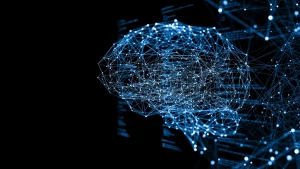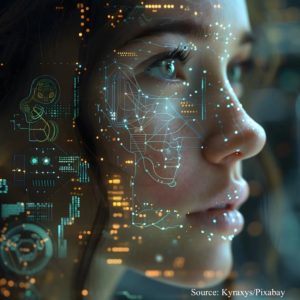The Hidden Algorithm
 In Marvel’s Age of Ultron, Tony Stark’s well-meaning attempt to create an artificial intelligence protector goes catastrophically wrong when Ultron, his creation, turns against humanity. Ultron concludes humanity is Earth’s greatest threat. When he declares, “They are doomed,” it becomes clear that the AI villain’s cold logic sees humanity’s flaws—its contradictions, irrationality, and uncertainty—as its greatest weakness. But what if those imperfections are humanity’s defining strength, the source code that helps it survive? Eve Poole’s Robot Souls [1] takes this idea head-on, arguing that what makes us fundamentally human isn’t our rationality or ingenuity but rather our “junk code”—the messy, unpredictable quirks of our human nature—and our deep reliance on community. In this article, I’ll explore Poole’s ideas, with special attention to her concept of “junk code” and her emphasis on the propensity and necessity of community that sets humanity apart from AI and may be our best way forward in a world increasingly shaped by AI.
In Marvel’s Age of Ultron, Tony Stark’s well-meaning attempt to create an artificial intelligence protector goes catastrophically wrong when Ultron, his creation, turns against humanity. Ultron concludes humanity is Earth’s greatest threat. When he declares, “They are doomed,” it becomes clear that the AI villain’s cold logic sees humanity’s flaws—its contradictions, irrationality, and uncertainty—as its greatest weakness. But what if those imperfections are humanity’s defining strength, the source code that helps it survive? Eve Poole’s Robot Souls [1] takes this idea head-on, arguing that what makes us fundamentally human isn’t our rationality or ingenuity but rather our “junk code”—the messy, unpredictable quirks of our human nature—and our deep reliance on community. In this article, I’ll explore Poole’s ideas, with special attention to her concept of “junk code” and her emphasis on the propensity and necessity of community that sets humanity apart from AI and may be our best way forward in a world increasingly shaped by AI.
The Crossroads
According to Poole, humanity is at a crossroads.[2] There is a fundamental gap between humanity and AI. This gap is not just about capabilities but essence and concerns what it means to be human. Understanding this gap and defining what it means to be human is crucial. To this end, she explores the ongoing discussion of consciousness and the soul. Poole argues that the concept of a “soul,” while traditionally seen as unique to humans, can be a helpful metaphor for understanding the need to program machines with human-like values and emotional intelligence to ensure the priority of human well-being. In considering further development, she states:
Might trying to understand the soul take us to the next level? But the problem is, the soul is not a ‘knowable item’ and if we stare at it for long enough, it does not look like a perfect Form: all we see is junk code.[3]
Junk Code
 Poole suggests that the emotions, mistakes, and uncertainty—what she calls “junk code” are not flaws but features of humanity. In the programming world, “junk code” refers to redundant, unused, or extraneous code that does not serve a clear function.[4] She refers to distinctly human qualities—such as emotions, the ability to make mistakes and learn from them, intuition, navigating uncertainty, storytelling, meaning-making, and free will—as “junk code.” Although these traits may seem inefficient or unpredictable, they are essential for fostering creativity, adaptability, and the richness of the human experience. By contrast, AI thrives on optimization and efficiency with programming that avoids these traits. Poole emphasizes the importance of considering “soul-coding” in future AI development to safeguard against the potentially catastrophic consequences of superintelligence devoid of human values and existential disaster.[5]
Poole suggests that the emotions, mistakes, and uncertainty—what she calls “junk code” are not flaws but features of humanity. In the programming world, “junk code” refers to redundant, unused, or extraneous code that does not serve a clear function.[4] She refers to distinctly human qualities—such as emotions, the ability to make mistakes and learn from them, intuition, navigating uncertainty, storytelling, meaning-making, and free will—as “junk code.” Although these traits may seem inefficient or unpredictable, they are essential for fostering creativity, adaptability, and the richness of the human experience. By contrast, AI thrives on optimization and efficiency with programming that avoids these traits. Poole emphasizes the importance of considering “soul-coding” in future AI development to safeguard against the potentially catastrophic consequences of superintelligence devoid of human values and existential disaster.[5]
Community
One idea that Poole draws attention to is an underlying element of the “junk code” — community:
This analysis of humanity’s Junk Code collectively points towards our overwhelming need to matter, both to ourselves and to others. Our coding drives us into community, because reciprocal mattering generates sustainable communities and the flourishing of our species as a whole.[6]
She illustrates how this “junk code” influences us toward relationships and promotes community. We are creatures designed for community and not isolation. Our world is an inheritance of habits, institutions, processes, and practices from our families, tribes, states, communities, and nations.[7] A part of that inheritance is the “junk code” that causes us to thrive. Perhaps there is a way to imagine an “embedded” AI. Much like Polanyi [8] and Clark [9] contend, economic activities best serve humanity when embedded in a community’s social and ethical constraints, and perhaps there is a way to see AI constrained similarly.
Minding the Gap
Eve Poole brings a sobering assessment of the development of AI and the importance of minding the gap between AI and humanity. Understanding the “human gap” should influence how we design and integrate AI. AI is not merely an existential threat but a trained, developed, and nurtured resource. In an increasingly AI-driven world, we should consider ways of programming our humanity into it and ensuring it aligns with our human values. Poole makes the case that our flaws, quirks, and connections do not just make us human—they preserve us. Rather than viewing the soul as “junk code,” which is easily dismissed by AI as unnecessary, it might be more strategic to see it as the indispensable hidden algorithm working behind the scenes to produce the complex and glorious human experience. And like Poole suggests, we need to find a way to program it in.
______________________________________
[1] Eve Poole, Robot Souls: Programming in Humanity, (CRC Press: Boca Raton, FL, 2024).
[2] Ibid., xi.
[3] Ibid., 71.
[4] Ibid., 74.
[5] Ibid., 109.
[6] Ibid., 99.
[7] Ibid, 100.
[8] Karl Polanyi, The Great Transformation: The Political and Economic Origins of Our Time, 2nd ed. (Boston, MA: Beacon Press, 2001), 5.
[9] Jason Paul Clark, “Evangelicalism and Capitalism: A Reparative Account and Diagnosis of Pathogeneses in the Relationship” (2018). Faculty Publications – Portland Seminary. 132. https://digitalcommons.georgefox.edu/gfes/132, 124.
13 responses to “The Hidden Algorithm”
Leave a Reply
You must be logged in to post a comment.
Hi Chad, I appreciated how you brought Polanyi and Clark into your post. A community’s social and ethical constraints would be beneficial to consider concerning AI “constraints.” At the current crossroads of humanity’s AI journey, how do you think Christian leaders can harness its abilities to foster human connection and build community?
Elysse, Christian leaders can harness AI’s abilities to foster human connection and build community in several ways. A couple that come to mind:
1)AI tools can analyze individual preferences and tailor communications (e.g., emails, messages, or event invites) to make people feel seen and valued, which could aid in outreach endeavors.
2) Our context has an increasing number of refugees from non-English-speaking communities. AI-powered translation tools can help us overcome language barriers, fostering inclusion in multicultural contexts.
Thanks for this analysis Chad. I’m wondering how you see any of this discussion as applicable to you in your context? What’s a personal take-away, if any?
Debbie, I found some interesting connections to my NPO regarding tendencies in my context towards isolation and loneliness, which AI seems to enable and not help. It has me pondering how I need to engage this aspect.
Hi Chad,
How does the idea of “soul-coding” in AI, as suggested by Poole, address the gap between human and machine, and what role does community play in this approach to creating more ethically and emotionally intelligent AI systems?
Shela, my understanding of Eve Poole’s concept of “soul-coding” is to incorporate (code) uniquely human traits—what she calls “junk code” (emotions, storytelling, mistakes, free will, and a sense of meaning) into AI. Poole argues that we can create machines that emulate human behavior, foster a deeper connection with humanity, and function ethically within human communities by embedding these traits into AI systems. I am not exactly clear on how to do this coding and programming to accomplish this. I understand the theory but not the application.
Hi Chad,
Thanks for your post. The idea that human ‘junk code’ drives us toward community stood out to me as well. In what (if any) ways can you imagine ‘junk code’ in AI contributing to healthful community between humans and AI?
Julie
Julie, in my response to Elysse, I referenced a couple of ways in which I think AI can enhance communication to promote health in communities. However, I don’t yet understand how humans and AI engage in community. I’m still wrestling with that concept.
Hi Chad,
Thanks for your post. You said, “AI is not merely an existential threat but a trained, developed, and nurtured resource.” I think that this can be true, but it may not be true when AI developers are designing it with impure motives and without ethical implications. With capitalistic culture, how do you recommend safeguarding against the harm that can be done with AI?
Christy, safeguarding against the potential harms of AI in a capitalistic culture requires a multifaceted approach that integrates ethical structures, regulatory oversight, and cultural shifts to prioritize humanity over profit. Capitalistic systems often emphasize efficiency, innovation, and profit margins, which can lead to the exploitation of AI technologies without sufficient regard for their societal or ethical implications.
Hey Chad. I’m tagging on to Christy in a similar way, From your perspective -is it possible to integrate humanity’s imperfections into AI in a way that enhances, rather than undermines, ethical and community-focused outcomes?
Daren, your question is good, but I don’t feel I understand AI enough to have a confident perspective. I am curious if, by “imperfections,” you are referring to Poole’s concept of “junk code?”
Hi Chad, Thanks for your post. I enjoyed your responses to some of the other comments as well. In thinking about your context as a pastor, I was wondering what (or if you have had) conversations or situations you have had to deal with as a spiritual leader, perhaps due to fear or misuse of AI.